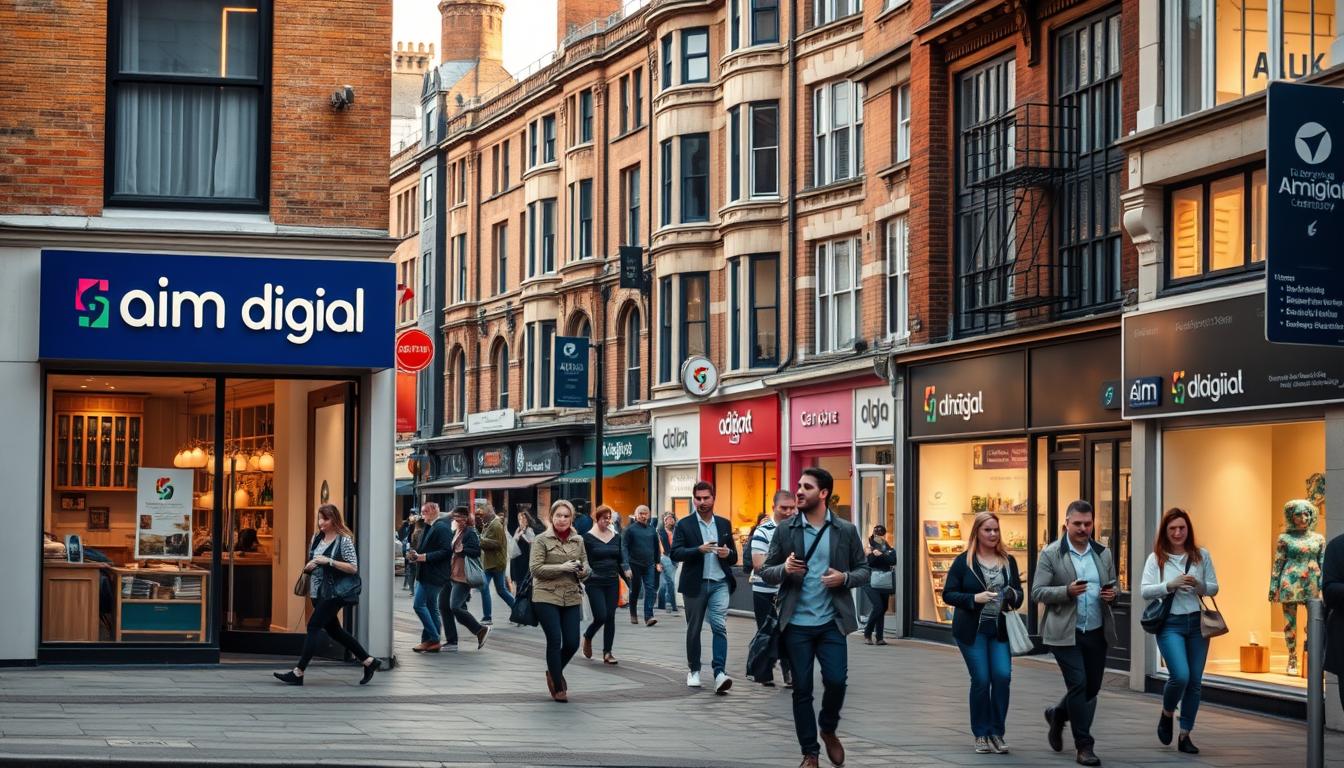In the world of digital marketing, having a strong online presence is key for businesses. Search engine optimization, or SEO, plays a big role in this.
Our team helps businesses boost their website traffic from search engines. We make your website better for search engines. This improves your online visibility and brings more relevant visitors to your site. For tips on improving your e-commerce site’s SEO, check out our guide on the best e-commerce platforms for SEO.
SEO is all about knowing how search engines work. We make your website fit their needs. This helps your site rank higher in search results.
Key Takeaways
- SEO is vital for better website visibility.
- Our team helps businesses with SEO.
- Optimising your website boosts your online presence.
- SEO brings more relevant traffic to your site.
- Understanding search engines is essential for good SEO.
The Fundamentals of Search Engine Optimisation
In today’s digital world, knowing the basics of SEO is key to a website’s success. Businesses need a strong online presence. So, understanding SEO is more important than ever.

Defining SEO in Today’s Digital Landscape
SEO makes your website more visible to people searching online. Effective SEO means knowing how search engines work and what people search for. Our team helps businesses improve their online visibility.
Optimising your website for search engines can boost your ranking. This means more people can find your site. For UK businesses, it’s a chance to reach more people and stand out. For expert help, consider a reputable local SEO agency.
The Evolution of Search Engines
Search engines have changed a lot over time. They now use complex algorithms that look at many factors. These advancements mean businesses must keep up to stay visible online.
Today, search engines look at things like user experience and content quality. They also check if a site works well on mobile devices. By understanding these changes, businesses can improve their SEO and get better results.
What is SEO and Why Does Your Website Need It?
In today’s digital world, knowing about SEO is key for any business wanting to shine online. SEO is not just a technical thing; it’s a must for growing digitally.
The Core Objectives of SEO
SEO aims to make your website more visible, bring in the right visitors, and make it easier to use. Our team works on several key points to hit these goals:
- Doing deep keyword research to get what people are searching for
- Improving on-page stuff like meta tags, titles, and content
- Fixing technical SEO like site speed and mobile-friendliness
By doing these things, businesses can really boost their online presence.
Measurable Business Benefits of Effective SEO
Good SEO brings many benefits that you can measure. Two big ones are:
Increased Visibility and Traffic
Optimising for search engines helps your business show up more in search results. This brings in more people who are actually interested in what you offer, leading to more sales.
Enhanced User Experience
SEO is also about making your website better for users. This means making it easier to navigate, more relevant, and easier to use. This makes users happier and more likely to come back.
As SEO expert, Rand Fishkin, once said,
“SEO is about understanding the needs of your audience and delivering content that meets those needs.”
By focusing on SEO, businesses can see big wins. From being more visible to keeping users engaged, it all adds up to better profits.

How Search Engines Function
Search engines are a big part of our online lives. But have you ever thought about how they work? We’ll explain how they find, store, and sort content for you.
Crawling, Indexing, and Ranking Explained
Search engines use crawlers or spiders to find new content online. They then index it, storing it in huge databases. When you search, the engine sorts this content based on what’s most relevant and useful.
Want to learn more about SEO and search engines? Check out our guide on what is SEO and how do search engines work.
Understanding Google’s Algorithm Updates
Google updates its algorithm often to better your search results. Key updates include Core Web Vitals and E-E-A-T principles.
Core Web Vitals
Core Web Vitals measure how well a webpage works for users. They look at how fast it loads, how interactive it is, and how stable it looks. Making sure your site meets these standards can boost your ranking.
The E-E-A-T principles focus on a webpage’s quality. Google checks if content is experienced, expert, authoritative, and trustworthy. Our team can help improve your site’s E-E-A-T by creating high-quality, trustworthy content.
On-Page SEO Elements That Drive Rankings
On-page SEO is key to a good digital marketing plan. It helps your site rank better. Making sure your website is well-optimised is vital for search engines to find and rank it.
Content Optimisation Best Practices
Content is central to on-page SEO. We suggest making your content engaging, informative, and relevant to your audience. Here’s how:
- Use keywords naturally in your content
- Organise your content with headings and subheadings
- Add internal and external links to boost credibility
- Make sure your content works well on mobiles and loads fast
Following these tips can make your site more user-friendly. This can help you rank higher in search results.
Technical On-Page Factors
Technical aspects of your site are important for search engines. Our team stresses the need for:
- Compressing images and using good alt tags
- Clean, descriptive URLs for your pages
- Having a secure site with HTTPS
Improving these technical aspects can really help your site’s visibility and ranking.
Meta Tags and Structured Data
Meta tags and structured data help search engines understand your site. We recommend:
- Writing catchy meta titles and descriptions
- Using schema markup for extra context
- Improving your site’s structured data
By focusing on these on-page SEO elements, we can boost your site’s ranking. This will attract more organic traffic to your site.
Content Strategy for SEO Success
SEO success depends on a good content strategy. It must appeal to users and search engines. A well-thought-out plan is key to driving organic traffic and boosting your online presence.
Keyword Research and Implementation
Effective keyword research is the base of a successful content strategy. We find the right keywords and phrases your audience uses. This makes sure our content is search engine friendly. Proper keyword implementation means using these terms naturally in your content, like in headings and body text.
Keyword research is vital. Here’s a table showing the steps involved:
| Step | Description |
|---|---|
| 1. Identify Seed Keywords | Determine initial keywords relevant to your business. |
| 2. Expand Keyword List | Use tools to expand your list with related terms and phrases. |
| 3. Analyze Competitor Keywords | Research keywords used by your competitors. |
| 4. Refine Keyword Selection | Select keywords based on relevance, search volume, and competition. |
Creating Content That Satisfies Search Intent
Understanding search intent is key to creating content that connects with your audience. Search intent is why a user searches for something. We categorize content into two types: informational and commercial.
Informational Content
Informational content aims to educate or inform users. It’s vital for making your brand a thought leader. Blog posts, guides, and tutorials are examples that drive engagement and attract links.
Commercial Content
Commercial content promotes products or services. It’s more transactional and aims to drive sales. Examples include product descriptions and case studies. Effective commercial content balances promotion with user value, making it persuasive and informative.
As Rand Fishkin, a renowned SEO expert, said,
“Content is the engine that drives the SEO machine.”
This highlights the importance of quality, relevant content for SEO success.
By focusing on a strong content strategy, including thorough keyword research and content that meets search intent, businesses can greatly improve their SEO.
Off-Page SEO Strategies
Effective off-page SEO boosts your website’s reputation online. Our team knows a good off-page SEO plan can increase your site’s traffic and rankings. This makes your website more visible to search engines.
Building a Natural Backlink Profile
A natural backlink profile is key for SEO success. We aim to get high-quality backlinks from trusted sites in your field. This means creating valuable content that others want to link to, guest blogging, and working with other reputable sites.
Here are some ways to build a strong backlink profile:
- Make high-quality, linkable content
- Guest blog on relevant sites
- Use broken link building techniques
Social Signals and Brand Authority
Social signals are important in off-page SEO. They show search engines your brand is popular and relevant. By being active on social media and encouraging people to engage, we boost your brand’s authority and visibility.
To make the most of social signals, our team suggests:
- Share content on different social platforms
- Encourage user-generated content and engagement
- Keep an eye on and reply to social media interactions
By using these off-page SEO strategies, businesses can improve their online reputation. This leads to more traffic and better search engine rankings. Our team is here to help you with off-page SEO and reach your digital marketing goals.
Technical SEO Essentials
Technical SEO is key to a website’s success. It makes sure search engines can find and rank your site well. This is the base of your online presence.
Site Speed and Core Web Vitals
Site speed is important for both users and search engines. Google’s Core Web Vitals measure how fast your site loads and how it works. To make your site faster:
- Optimise images and compress files
- Leverage browser caching and minimise CSS
- Use a Content Delivery Network (CDN) to reduce latency
Mobile-First Optimisation
Most searches are now on mobile. So, designing for mobile first is vital. Your site should work well on all devices. Key points include:
- Responsive design that adapts to various screen sizes
- Mobile-friendly navigation and content
- Testing for mobile usability and performance
Site Architecture and Internal Linking
A good site structure is essential. It helps both users and search engines understand your site. Good internal linking:
- Guides users through your website
- Distributes link equity and enhances page rankings
- Helps search engines understand your site’s structure
For tradesmen, improving their website for search engines is very important. It can greatly increase their online visibility. For more tips, visit AIMedia’s SEO for Tradesmen page.
Local SEO for UK Businesses
In today’s digital world, UK businesses need a strong local presence. We teach our clients about local SEO. It helps bring more targeted visitors to their sites.
Google Business Profile Optimisation
Optimising your Google Business Profile is key for local SEO. We make sure your online presence is correct, current, and attractive. This means having the same business name, address, and phone number everywhere.
UK-Specific Local Ranking Factors
Knowing UK-specific local SEO factors is essential. We look at local citations and NAP consistency to boost your local search visibility.
Local Citations and NAP Consistency
Local citations from trusted UK directories boost your credibility. We stress the need for NAP consistency. This helps avoid confusion for search engines and customers.
Reviews and Reputation Management
Good reviews are vital for local SEO. Our team helps you manage your online reputation. We encourage happy customers to review and address any negative feedback quickly.
By using these local SEO tactics, UK businesses can get more online visibility. This attracts more local customers and boosts sales. Our team supports you every step of the way. For more details, visit our about page.
Measuring and Analysing SEO Performance
To check how well their SEO works, businesses need to watch key performance indicators and use analytics tools. This helps them make smart choices and tweak their plans as needed.
Essential SEO Key Performance Indicators
We look at a few important indicators to see if our SEO is working. These are:
- Organic traffic growth
- Search engine rankings for target keywords
- Conversion rates from organic traffic
- Bounce rates and average session duration
By keeping an eye on these, we can see how our SEO is doing and find ways to get better.
Analytics Tools and Reporting
Using analytics tools well is key to understanding SEO performance. Our team uses tools like Google Analytics and Search Console to get insights.
Google Analytics and Search Console
Google Analytics gives us lots of info on website traffic, how users behave, and conversion rates. Search Console shows us search engine rankings, impressions, and clicks. By mixing data from both, we get a full picture of our SEO performance.
Knowing the competitive scene is essential for UK businesses. We do competitive analysis to spot market gaps and chances. This helps our clients stay ahead of rivals.
By looking at SEO performance and using analytics tools, we craft plans that boost business growth and increase online presence.
Conclusion: Building a Sustainable SEO Strategy
Creating a lasting SEO strategy is key for online success. We’ve looked at SEO basics, its role, and ways to boost your site’s visibility. This is vital for your website’s growth.
Understanding how search engines work is important. We’ve covered on-page, off-page, and technical SEO. These help your site rank better and attract more visitors.
A good SEO plan needs constant work and keeping up with search engine changes. Our team suggests always checking your site’s performance and data. This helps you stay competitive.
Long-term SEO builds a strong online presence. It drives business growth and meets your digital marketing aims. Keep learning and updating your SEO tactics to lead the way.






